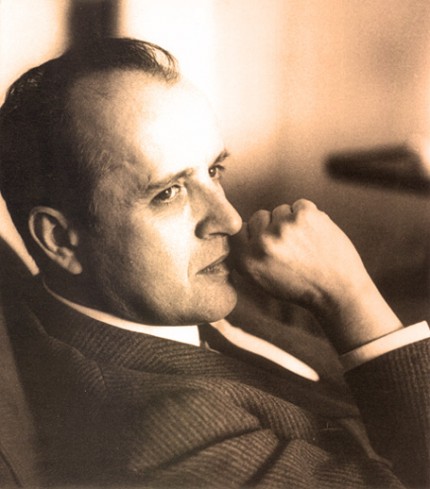Muti offers a sampler of his mentor Nino Rota

If Thursday night’s free concert in a South Side church was the unofficial kickoff of the Chicago Symphony Orchestra season and Saturday’s lavish formal Symphony Ball its ceremonial opening, sandwiched in between was the first subscription concert of the new season on Friday afternoon.
The program was the same as Thursday night with one key substitution: Verdi’s Overture to Giovanna d’Arco was traded in a suite from Nino Rota’s film score from Il Gattopardo.
Riccardo Muti has often mentioned his mentor, Italian composer and conductor Nino Rota, at press conferences and interviews since arriving here. Friday afternoon’s concert represented Muti’s local musical introduction of Rota, and he was obviously determined to make it a memorable occasion. Instead of programming excerpts from one of Rota’s whimsical Fellini film scores or the popular Godfather music, Muti instead chose to offer a suite from the 1963 Visconti film, Il Gattopardo (The Leopard).
Unlike the suite of dances for chamber orchestra from the film that Muti recorded at La Scala in 1996, this was a half-hour of music for very large orchestra that also included piano and celesta and existed stylistically somewhere between Rota’s film scores and his “serious” concert works.
The music largely calls for big, beautiful string sound and Muti was able to elicit lush, lyrical section playing without spilling over into excess, exquisitely crafting every phrase and carefully folding in concerto-like woodwind writing.
Given the work’s repetition and unabashed sentimentality, Muti seemed intent on making the music sound better than it was. It was clear that the quality of the performance was at such a high level that it almost obscured issues of the appropriateness of film music left to stand on its own in the concert hall.
The Leopard is a vintage sweeping Romantic score (the movie and book it is based on take place in the 19th century) that, unlike so much of today’s literal film music, leaves little to the imagination, Rota’s score represents old school, Old World film composers of the 20th century who sought to convey levels of meaning that penetrate deeply beyond what is shown on the screen.
As if to apologize for the conventional nature of what was heard, Muti stopped the applause at the end of the piece to mention that “Rota wrote this kind of music because those were feelings he wanted to convey. But as his pupil, I can tell you, he could play Wozzeck at the piano from memory.”
The works repeated from Thursday night were more solidified on Friday afternoon: the balance of soloist to orchestra was tighter in Mathieu Dufour’s rendition of Ibert’s Flute Concerto and the momentum of the Tchaikovsky Fifth Symphony more engaging.
The best that can be said for principal horn Dale Clevenger’s second attempt at the Andante’s beloved theme was that his inconsistent unsteady tone did not break down completely as on Thursday. It also must be noted that there was an ill-timed clarinet squawk in the third movement, but these were the only blights on an otherwise spirited and nuanced performance.
The program will be repeated 7:30 p.m. Tuesday, September 27; cso.org; (312) 294-3000.
Posted in Performances


Posted Sep 24, 2011 at 2:00 pm by stickles
My first trip to the Orchestral Hall will be Tuesday for this program, so I cannot say anything about the Rota piece specifically. However, I did hear Riccardo Chailly and the La Scala Philharmonic perform music from La Dolce Vita a few years ago. Reading your review has left me somewhat vexed. If incidental music from Egmont, Midsummer Night’s Dream or Peer Gynt are considered proper for the concert hall, why not film music? Since its very beginning, film had tremendous influence on the development of music, not of only its content, but also of its technique. Additionally some accuse classical music as being elitist. I often see it as not because the attire they wear, the venue they play, or even the music. It is sometimes the critics. Here is Maestro Muti and the orchestra reaching out into the neighborhoods, possibly bringing in new audience into Symphony Center to enjoy Rota’s music. Now if they really enjoyed this music, but only to find out the next day’s newspaper deemed it “inappropriate” for the “concert hall”, they might think twice before coming downtown again. For a critic, there is a fine line between voicing a personal opinion and passing down a judgement. It might be worthwhile to revisit that distinction again from time to time.
Posted Sep 24, 2011 at 4:20 pm by Dennis Polkow
There is much more being read into this review than was actually stated. I greatly enjoyed this music and its performance and am actually an admirer of Nino Rota. What I wrote was that “the quality of the performance was at such a high level that it almost obscured issues of the appropriateness of film music left to stand on its own in the concert hall.” The underlying issue — which again, I am saying was nearly forgotten — was that this is music written not to be heard on its own but rather to enhance specific screen images. Here the music stood alone without those images, yet worked well nonetheless.
Posted Sep 24, 2011 at 5:09 pm by Tod Verklårung
My issue with the Rota piece was not an abstract concern about film music, but that this particular piece by Rota is so empty. The care taken with it was obvious. But most of that time could have been better spent on any one of dozens of other compositions that are rarely played by the CSO.